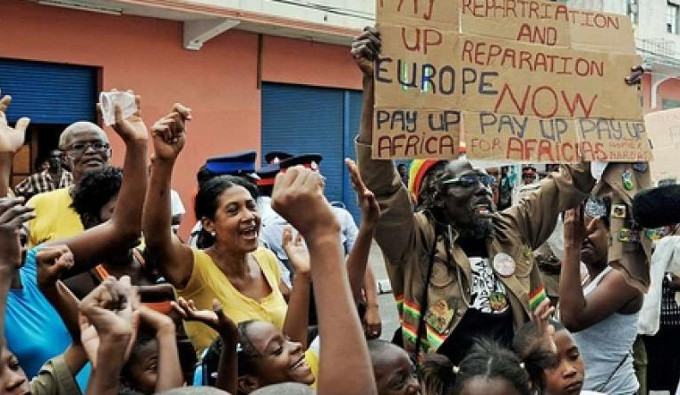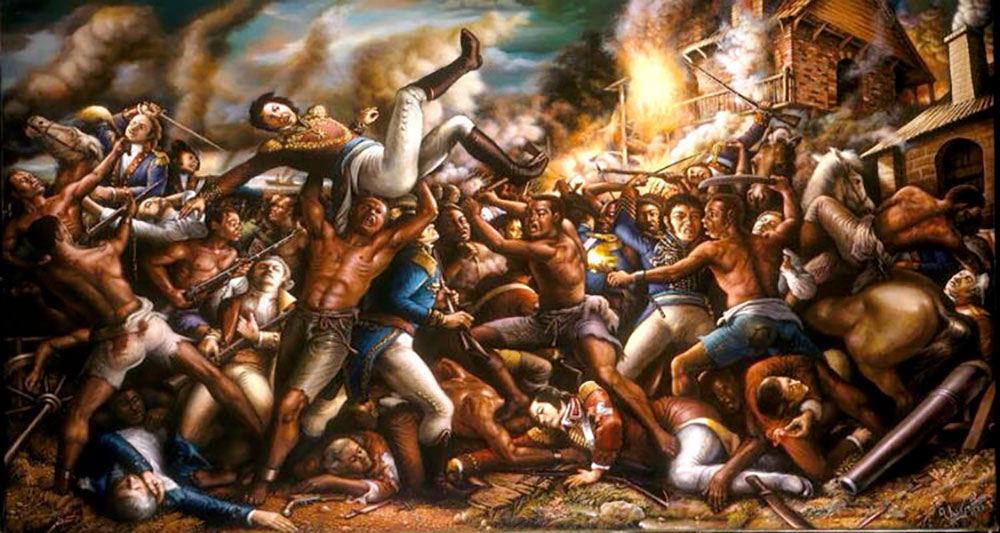It is not a question of retracing the entire history of the cause of the repairs here, but of bringing my personalized perspective. I see reparations as the policies, acts or measures put in place or imposed at all levels to correct today or tomorrow errors or injustices from the past which continue to have decisive and structuring consequences in the present time. . Reparations therefore take a critical look at history and question the nature of injustices in a transversal and global manner while taking into account elements of subjectivity specific to the experiences of people directly impacted by said errors or injustices.
The reparations concern in my case the human, material and immaterial destruction that has occurred during the history of slavery, trafficking, colonization and neocolonialism due to all the ideologies and policies of domination and predation that derive, in particular, racism, capitalism, colonialism, sexism and neoliberalism.
The victims of the history of trafficking, slavery and colonization are alive through their descendants who are entitled to invoke the harm suffered. Damages that sometimes arise at the very level of a State like that of the Republic of Haiti, forced in 1825 by France to pay a debt to compensate the settlers expelled from the country after the military victory and independence of the 1st January 1804. Damages which in other cases are indeed difficult to circumscribe from a geographical point of view, the trafficking having been a vast movement of transidentitary and transnational deportations.

The culprits are obviously dead, but a minority is still alive among those responsible for the worst crimes as in the context of the colonial wars in Cameroon or targeted assassinations, such as those of Patrice Lumumba in Congo. The racist and colonial crimes committed by a minority of actors – and the majority of whom have never dissociated themselves from history – ensure that, through the economic or cultural influence of this or that Western nation, their descendants are alive and well. to benefit from privileges, while refusing to recognize much of their origin.
Control of history is a privilege of domination
Everyone tries to shirk their responsibilities on the other or on a third party, while denying the other or this third party the possibility of responding. This is how reparations demands often run up against the idea that “Africans sold Africans”, that Arabs “did worse” and that ultimately, “everyone sold everyone”. This way of linking impunity to false reconciliation at a time when we know that all descendants have an obligation to cohabitate is very cynical, courageous and politically toxic.
These questions require asking the historical continuity of the crime without excluding a whole genealogy of African leaders whose impunity is linked in part to the protection of the former colonist who rewards them for their complicity but also to the search for their own particular interests. .
The constructed and organized inability of the African elite to confront colonial and racist domination at the time of decolonization gave birth to dominated states, states that refused on their own or under the pressure of exogenous interests, to constitutionalize the right to development and therefore the principle of restorative justice. In the negotiations of the Round Table in Brussels for the independence of the Congo, Patrice Lumumba posed this question of reparations, and the Congo was returned to the Congolese with a debt to Belgium and the planned assassination of Lumumba .
Reparations question the philosophy of African law
Ma’at, the philosophy of ancient Egypt, posits reparation as the restoration of the reign of equity and solidarity in the face of disorder. In the Swahili civilization, which produced concepts like Ubuntu (I am by what we are), the term Maafa refers to the cataclysm of deportation and slavery. Cheikh Anta Diop also devised a whole policy of reparations on languages which are categories of power and conceptual equivalence. The Mandé Charter of 1222 which stipulates that “any harm caused to a life requires reparations” also constitutes a jurisprudence. In 1729, the African philosopher Anton Amo defended a thesis entitled The right to be free of members of the African diaspora in Europe. In 1772, the Somerset slave won his freedom by suing his master in England. The demand for reparation was already formulated at that time, and the way in which Europe legislates on populations of African origin still today is in keeping with the spirit of a Code Noir that has never been abolished. The black presence in France is therefore a strategic issue both for repairs and for recolonization.
Racism against black people is a consequence of the lack of reparations. This is a hallmark of the culture of impunity developed in the rest of the world’s relations with Africa as a result of this colonial history.
Reparations pose a principle of compulsory restitution after any act of dispossession, whether of land, people or resources. The absence of reparations at the time of the abolition of slavery and the compensation of slavers means that on the one hand, economic relations have remained marked by racism, and on the other hand, race relations are marked by this culture of the impunity visible in negrophobia or racial crimes which show that black lives are worthless.
A fight to decolonize development economics
Based on Walter Rodney’s essential work, How Europe Underdeveloped Africa, it is about rebuilding a pan-Africanist and decolonial economy. Development would be the result of the social factor, multiplied by the factor of political autonomy, from which we subtract the imperialist and neoliberal factor. The social factor would be a balance between the State, the private sector and the communities, with a social link around the rural workers who are the main ones concerned by a policy of reparation based on the redistribution of land, on an ecological dimension taking into account the environment. unity of ecosystems, and finally cultural equivalences. The factor of political autonomy would be based 1) on the expertise of the population in the field of technology and training, 2) on a participatory budget policy backed by a fiscal revolution and 3) on a democratic mechanism control of currency and prices.
Widely enriched since the first Pan-African conference on reparations held in Nigeria in 1993, the recommendations relating to reparations include:
- put an end to the defense of the crime of slavery and colonization
- release or pardon political prisoners of colonialism and apartheid
- return stolen land and address the environmental impact of predation
- finance places of memory
- integrate the history of Africa and the diaspora into school curricula
- fund right of return or genealogy mechanisms
- fund research into the crimes of slavery and colonization
- return stolen cultural property
Repairs therefore serve several purposes:
- lay the foundations for a reconciliation between groups aggrieved by history
- make reconciliation a permanent job
- recognize the resistance of the victims in the face of barbarism
- prevent repetition of crime by cultivating memory
These points therefore constitute the references of my overall work on the theme of reparations.

